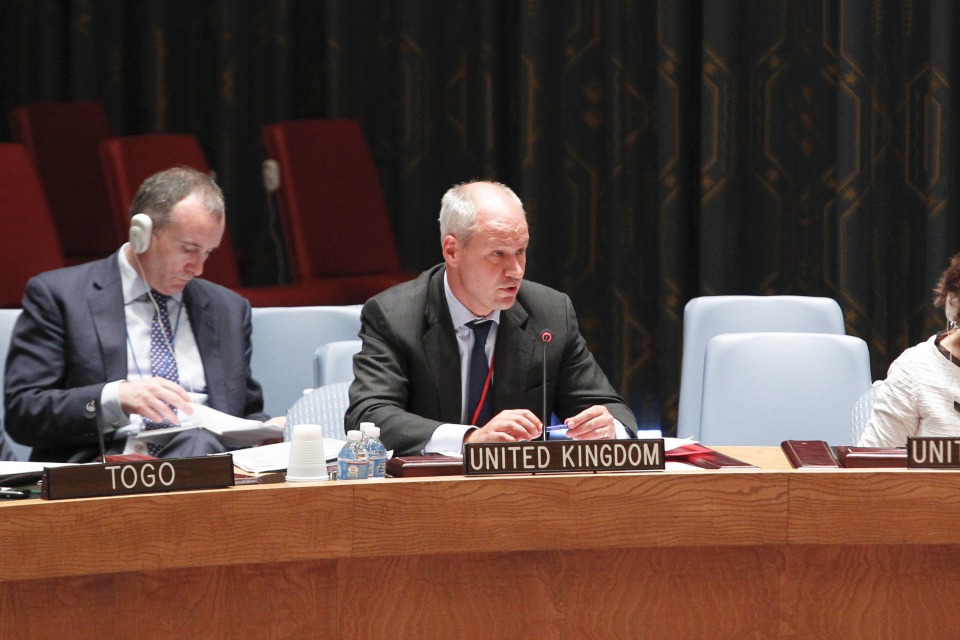‘UK is committed to finding a peaceful solution on the nuclear issue’
Statement by Ambassador Wilson, DPR to the UK Mission to the UN, following the Iran 1737 Sanctions Committee Briefing to the UNSC

Thank you very much Mr. President.
I hope you don’t mind if I introduce myself by name because this is the first time I’m addressing this council. My name is Peter Wilson. I am the new Deputy Permanent Representative for the UK. It’s an honor to be in this group and I’m proud to be here too.
First of all Mr. President I really do want to thank the 1737 Committee, under your Chairmanship, as well as the Panel of Experts, for their continued work in supporting implementation of the Security Council’s Resolutions on Iran.
The UK, like others in the international community, does remain deeply concerned by Iran’s nuclear programme as others have said very clearly today. The latest IAEA report, released on 28 August, highlights Iran’s installation of around 1,000 more advanced centrifuges. They are now capable of beginning enrichment at short notice, and its continued rapid installation of regular centrifuges elsewhere. There is no plausible civilian purpose for the amount of enriched material that Iran already possesses, let alone the amount that it can now produce and after ten meetings Iran has also made no progress on addressing the IAEA’s questions over the possible military dimensions to its nuclear programme.
Iran has a new President and it has a new cabinet team. We were interested to hear from Under-Secretary-General Feltman about his discussions earlier this week in Tehran during a horizon scanning meeting that was held yesterday. We agree with others in the council that President Rouhani has an opportunity to pursue a different course for the future by addressing international concerns about Iran’s nuclear programme, and its other destabilising activities across the Middle East. If he does this, a more constructive relationship with the international community will be possible. As the British Foreign Secretary said recently: “If Iran is prepared to make that choice, we are prepared to respond in good faith.”
Mr President,
Turning to the work of the Committee, we regret that Iran continues to breach its international obligations. In particular, the Panel of Experts reached the clear and unanimous conclusion in its January report that Iran’s ballistic missile launched last year constituted a violation of paragraph 9 of resolution 1929.
As our President, as yourself has just briefed us, and others have underlined in this council, efforts by the Chair to engage with Iran on this issue have unfortunately been spurned; Iran has still not responded to the Committee’s letter of 12 April requesting further information, despite requests to do so. So we, along with others, reiterate our view that the Committee must now take appropriate actions in response. The evidence of this breach is compelling; the Committee needs to recognise this formally as a violation of UN sanctions. It should then take further action, including an Implementation Assistance Notice to assist all Member States with implementing ballistic missile-related sanctions on Iran, as well as considering the designation of those involved.
Mr President,
The Panel of Experts final report of May this year makes six recommendations to this Committee, including the designation of a company involved in Iran’s proliferation efforts, and proposals to provide guidance to Member States on the implementation of sanctions. It is disappointing that little progress has been made in implementing these recommendations. They are or should be uncontroversial. The Committee should redouble its efforts to make swift progress on implementing these.
We are also concerned in the UK by credible information that Iran continues to illicitly transfer arms within the region - in contravention of the UN embargo on the export of weapons by Iran - as the Panel’s reports on Gaza and the illicit arms interdiction reported by the Government of Yemen demonstrate. Iran’s continued efforts to increase instability across the wider region and beyond must end. The UK calls on the Panel to continue to monitor these issues, identify individuals and entities responsible and include recommendations in due course.
More generally, we are increasingly concerned about the failure of the Committee to take clear action in a number of specific recent cases. It is the 1737 Committee’s role and responsibility to monitor and take action on alleged violations of Security Council resolutions on Iran, and to strengthen the effectiveness of those measures. This unity and resolve has become less evident in recent months. We urge the Committee to come together and collectively address these issues, or it will not fulfil its mandate.
Mr President,
The UK remains committed to finding a peaceful, negotiated solution on the nuclear issue, as others have said and argued for. If Iran is prepared to engage seriously in negotiations on its nuclear programme, we are ready to respond in good faith. The Confidence Building Measure proposal tabled by the E3+3 in Almaty is a fair and credible offer. We urge Iran to engage with that offer seriously. But until Iran takes positive steps to address international concerns, the political and economic pressure will increase.